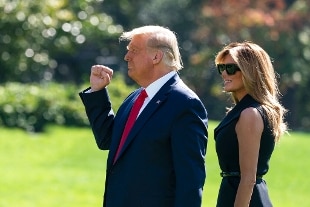Donald and Melania Trump
Usa 2020, Trump and Biden: the last duel
Share
In recent days, Russia has hacked state and local computer networks in the United States as part of an effort to interfere with the presidential elections on November 3.
The New York Times reports this, citing Intelligence sources and stating how the Moscow operations would have the purpose of helping Donald Trump's re-election also exacerbating the situation and fomenting chaos after the election result, especially if there will be no immediate clear winner.
The European Union and the Russian cyber attack in 2015
In these hours, the European Union also imposed sanctions on the head of Russian military intelligence, Igor Kostyukov, and another official claiming to be responsible for a hacking attack on the German parliament in 2015. Russia denied the allegations in May calling it a "trivial story" and claimed the EU had no evidence.
The EU, in its Official Gazette, said it had sanctioned Kostyukov, head of the military intelligence agency (GRU) for hacking the email of German Chancellor Angela Merkel's constituency office.
EU measures also target Dmitry Badin, accused of being the hacker who orchestrated the attack, as well as the so-called 85th Main Center, or Center 85, which was the unit within the GRU used to carry it out. .
It is also known as the GRU Special Services (GTsSS) division.
The hacking of the president's Twitter account, denied by Social
Media Until a week ago, Donald Trump's password would have been "maga2020!", Which is the acronym for 'make America great again', a slogan dear to the tycoon.
Dutchman Victor Gevers, who guessed it in 2016, would do it again.
By typing this word, not exactly original, he entered the profile of the American president.
Gevers, a security expert, told De Volkskrant, a Dutch newspaper, and produced as proof a screenshot of the hacked account.
Before he got the right password, Gevers had made other attempts, after which he expected to be locked out.
"Or at least - he explained, adding that the account did not have a double verification request - that they ask me for more information".
Frightened, says the newspaper, he tried to warn the CIA, the White House, the FBI and Twitter itself, but no reply came. "After a few days he was contacted by the Secret Service and thanked.
Thesis denied by Twitter: "We have not seen any evidence to corroborate this news published in the Netherlands", a spokesman said, noting that "we pre-emptly apply security measures for the accounts of a designated group of high-profile figures".

